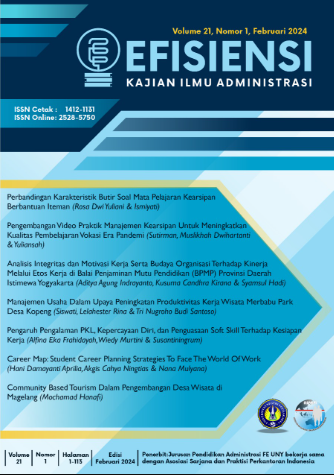| Journal title | Efisiensi : Kajian Ilmu Administrasi |
| Initials | Efisiensi |
| Frequency | 2 issues per year (February & August) |
| DOI | Prefix 10.21831 |
| ISSN | 1412-1131 (print) | 2528-5750 (online) |
| Editor-in-chief | Arwan Nur Ramadhan |
| Publisher | Universitas Negeri Yogyakarta |
| Citation | Scopus | Sinta | Google Scholar | Garuda | Dimension |

Efisiensi: Kajian Ilmu Administrasi is a scientific journal reporting office administration research with a focus on:
1) Office Administration Education, 2) Office Information Technology, 3) Office Resource Management, 4) Office Administration, 5) Office Management, 6) Automation Office Technology, 7) Office Technology, 8) Public Relations, 9) Office Simulation, 10) Event Management, 11) Excellent Service, 12) Secretarial, 13) Correspondence, 14) Communication, 15) Organization, 16) Record Management, 17) Leadership, 18) Business Administration, 19) Public Administration, and 20) Human Resource.
The journal is published by the Administration Education Program, Faculty of Economics, Universitas Negeri Yogyakarta, two times a year (February and August). In 2019, it was accredited by Sinta 3.
A collaboration agreement was signed on March 7, 2020, at the State University of Jakarta with Asosiasi Sarjana dan Praktisi Administrasi Perkantoran (ASPAPI) Pusat. (memorandum of agreement)
The editorial team invites lecturers, researchers, teachers, students, and others to submit manuscripts related to office administration. Author guidelines are available here, and templates are available here. Use the online submission system and adhere to the publication ethics. Review and publication procedures follow the guidelines.
Best regards,






















































